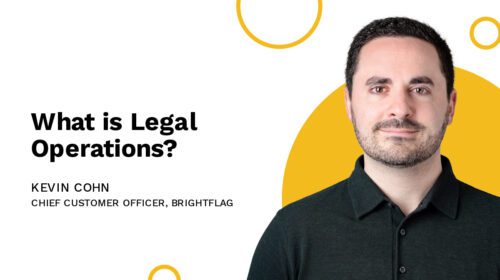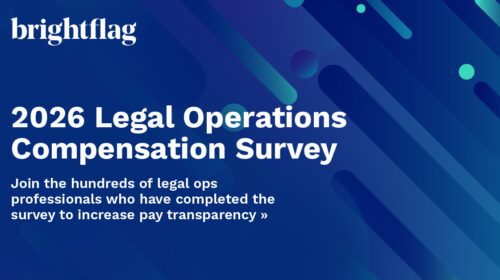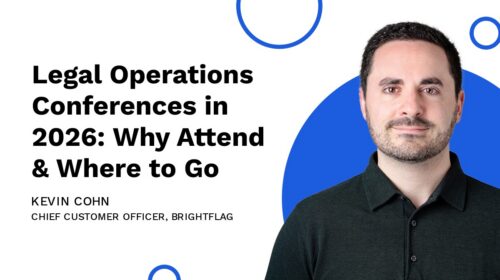The Surprising Realities of Reaching the General Counsel Role: An Interview with AccuWeather’s Jennifer Chung
Jennifer Chung, General Counsel at AccuWeather, joined Brightflag for a conversation about the challenges of transitioning to the General Counsel role, how she prioritizes projects for her legal team, and how to ensure you’re always on the cutting edge of new developments in the legal space.
You recently transitioned from Associate General Counsel to General Counsel at AccuWeather. Have the realities of the new role matched your expectations?
First, let me say I am thrilled to be in this role for a forward-leaning global company that is constantly pushing the frontiers of science to make people’s lives better. In terms of the realities of the role itself, I always had a feeling the GC role would require someone with more knowledge or expertise in employment, immigration, and high-level corporate governance matters. I figured that must be the desk where those issues land in the legal department, and I was right.
Thankfully, I have a responsive legal team and experts on-call to assist me. I also have the input and support of a dynamic and diverse leadership team. Without that solid support network, my onboarding would have been much more difficult.
I also expected that I’d have more autonomy in decision making and I do. Instead of seeking authorization or permission to act on smaller matters, I can just make the decision and move forward quickly. So that’s been really gratifying.
I think I’m still a little bit overwhelmed, though, by the responsibility of being in such a visible position. I had some sense that it would be like this, but actually living it is something different. Six months ago I was one of the people coming to the GC with notions of the person I needed them to be, or specific results I wanted to achieve. Now I’m the one sitting in that chair.
People now come to me asking things that they never would have before. It’s been a lot of fun learning about the inner operations of the business and how organizations are managed generally. But there are moments when I feel like I had it easy in the AGC role, when I could just do my work on a small portfolio and be done with it. So I guess I wasn’t expecting to miss that part, but I do a little bit.
I actually know some people who reached the GC role and then purposefully relegated themselves into a subordinate position. I always wondered if those moves were inspired more by burnout or misaligned expectations. But now I’m realizing it has to be a conscious choice to accept and fully embrace the weight of expectations and responsibilities.
Now that you have that broader range of influence and interaction across the organization, how are you hoping to shape the relationship between Legal and the rest of the business?
I’ve always viewed Legal as a pure service provider. We engage in business decisions only to the extent that we have valuable insights to share, such as institutional knowledge of how deals have gone (or could go) bad. But I will never unnecessarily inject Legal into a conversation where money is going to be made. It’s not my job to hamper decisions or slow transactions. I assess risk based on context and circumstance, raise concerns judiciously, and otherwise make sure my clients feel supported.
If our legal department is creating a system of roadblocks that make it difficult for our colleagues to get what they need, then we quickly run the risk of becoming obsolete. So I make sure everyone on my team understands this reality and strives to be as flexible as we can be when responding to challenging inquiries.
At the same time, I also think it’s important for the business to gain familiarity with Legal before our insights and services are ever required. One way I facilitate that is by using newsworthy stories as a way to get people thinking about emerging issues.
I realized a long time ago that inviting everyone into a conference room for a 40-slide PowerPoint presentation on the mechanics of U.S. trademark law is not an effective recipe for learning. You can’t be that heavy-handed. So recently I created an internal Slack channel (#lawinthenews) where I highlight some of the surprising legal factors behind quirky or notable headlines.
Ideally, this provides useful context for deciding when something should be brought to Legal’s attention. And I think it’s a great way to quietly cultivate intellectual curiosity and personal accountability.
I imagine educating yourself on emerging issues has become even more important now that you’ve shifted into a generalist role. How do you get up to speed on new topics fast?
As I mentioned, we have an experienced and dynamic leadership team I can lean on. But I’ve also spent the last 10-15 years consciously building a network of subject matter experts that I can tap into for various insights when needed. And to be clear, this kind of resource is not built by simply collecting connections on LinkedIn. You need to be meeting people, getting to know them, and developing these relationships over time.
Whenever I attend conferences or travel to a new city, for example, I always try to find time for coffee with my local contacts. I think these face-to-face interactions are crucial. When an issue does arise, I want to feel that I have a genuine connection I can reach out to. And of course, these relationships need to be reciprocal. So I’m always delighted to respond to members of my network who seek my expertise.
In addition to building that brain trust, I definitely read a lot of industry news. It could be LinkedIn statuses, Law360 articles, or a newsletter from a law firm I respect. I just want to know what’s out there and surround myself with multiple perspectives. Because one of the feelings I hate the most is being surprised by something I should have known but didn’t. It’s impossible to be fluent on every topic, but I at least want to recognize the language.
I think I’m also more open than most people in my position when it comes to taking meetings with vendors and law firms. There’s so much more out there than any one of us can possibly know, and I like the idea that in a 10-15 minute conversation someone can introduce me to interesting new ideas. But I do expect when people are pitching me that they’ve done some diligence and research.
What really frustrates me is when those conversations immediately turn into a discussion of rates. That’s never going to be the differentiator that grabs my attention. What’s far more interesting to me is the depth and range of their subject matter expertise. Creative problem solving is also a key component of our brand at AccuWeather, so we value that in other partners as well.
Sometimes I’ll even toss topics out there just to gauge awareness and gather opinions. Your primary specialty may be IP, for example, but if you can’t comment intelligently on consumer data protection regulations or compliance as well then I can’t be sure you truly understand my business.
When you’re evaluating outside counsel, what separates exceptional attorneys from capable professionals?
I used to think when I was just getting started in the profession that if you have the right checklist of credentials — Ivy League undergrad, a Top-10 law school, a job at BigLaw, then at a certain point in life you inevitably become an expert. Now I realize just how naive and superficial that mode of thinking is.
I’ve met so many people who check those boxes but are unable to offer anything of value in the moment. They’re sitting across the table, expecting me to pay them $800 per hour, while I’m the one educating them about what’s really going on.
What I’ve started to do instead is to ask what they’re working on and reading about. Their answer to “what’s trending for you?” can signal so much. Or again, I’ll introduce a seemingly unrelated topic such as what Brazil’s new GDPR equivalent might mean for the region. That’s a much more useful conversation to have with a prospective firm or consultant because it tells me who’s at the top of their game and thinking about what matters to me.
I actually had this amazing conversation with a law firm recently. The main agenda was a discussion of potential defensive litigation needs, but then one of their reps casually brought up the topic of CCPA to get my thoughts on the compliance considerations for AccuWeather’s products. The resulting conversation was so clearly tailored and well-informed that I’m now in the process of engaging them as our standing data privacy counsel.
I don’t know her academic credentials or where she worked before, but she quickly conveyed an on-the-ground awareness I know is going to be an asset to our business.
Are there any issues that you’ve changed your opinion on recently?
I guess I would go back to that concept of credentials. I’m realizing more and more how damaging it can be when teams are fixated on schools, grades, and past employers, rather than the actual substance of someone’s contributions and the breadth of their knowledge and experiences. Especially since the first half of my career, I’ve really shifted perspective on how I see myself and how I see the people I work with, for, and around.
What’s the quality and quantity of activities they’re involved in outside the office? How well do they juggle those commitments? Those are much better indicators of how a potential colleague would organize their time than assuming a certain level of proficiency based on their alma mater.
I assess someone’s attention to detail in a similar way. What deep dives have they pursued? How well do they write and speak about what they’ve learned? That tells me much more than the promotions they may have received at their last firm.
What are some things you wish more people in the legal community were talking about?
Brand protection is an area I’ve become very passionate about (and I don’t just mean trademark infringement). I think everyone should be thinking more about their personal brands — their integrity, their social media presence, how they present themselves in person. And the element I’m not seeing often enough there is a layer of kindness and inclusion.
Particularly within the legal community — and even more so among women within the legal community — we need to get to a place where we view our junior talent not as rivals or nuisances, but as future colleagues and clients. Too often I see people disregard the junior lawyer in the room or junior member on the team, and I wish they’d consider the fact that they could be working for that person 10 years from now.
I’m in an interesting spot where I’m about a decade removed from law firm life, and suddenly all these former partners and associates I worked with want meetings with me. Sometimes they haven’t spoken to me in the interim even once, and their appeals to our common history as the sole reason for connecting end up feeling a bit inauthentic.
In those instances, I would prefer efforts to get to know each other as the people we are now. And, in the meantime, I’m all about showing people the kindness and inclusion they deserve regardless of status because it’s clear to me that we’re all in this together.


